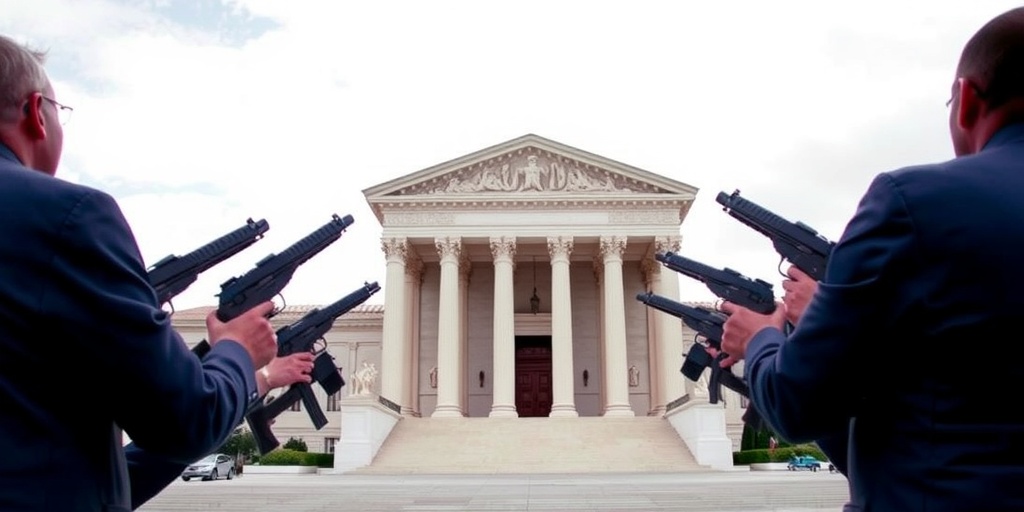Now Reading: Supreme Court to Hear Mexico’s Case Against U.S. Gun Manufacturers
-
01
Supreme Court to Hear Mexico’s Case Against U.S. Gun Manufacturers
Supreme Court to Hear Mexico’s Case Against U.S. Gun Manufacturers

Supreme Court to Weigh in on Mexico’s $10 Billion Lawsuit Against U.S. Gun Manufacturers
On Tuesday morning, the Supreme Court is set to hear crucial oral arguments regarding a significant legal battle that could have widespread implications for both U.S. gun manufacturers and international relations between the United States and Mexico. The case involves a $10 billion lawsuit filed by the Mexican government against several U.S. gun manufacturers, which Mexico claims have contributed to the rampant violence caused by drug cartels across its borders.
The lawsuit, initiated in 2021, contends that U.S. gun makers, along with a distributor, have fostered an "iron river" of military-style weapons flowing to criminal organizations in Mexico. This unprecedented suit comes at a time of escalating tensions between the two countries, especially considering new tariffs imposed by the Trump administration scheduled to take effect concurrently with the hearings. The outcome of this case has the potential to set a precedent regarding accountability for gun manufacturers in relation to international crime.
A conservative supermajority (6-to-3) in the Supreme Court has historically tended to expand gun rights, leading many legal experts to speculate that the justices may view the case skeptically. Nevertheless, the lawsuit provides a platform for the Mexican government to argue that U.S. companies share responsibility for violence stemming from drug trafficking and organized crime. Legal experts and observers are keenly watching the proceedings, given the sensitive nature of the issues at hand.
In Mexico, access to firearms is heavily regulated, making it nearly impossible for the general populace to legally acquire the military-style weapons often favored by drug cartels. In its legal filings, Mexico pointed to data that suggests 70% to 90% of the firearms recovered from crime scenes in the country originate from the United States. Moreover, they highlighted that gun dealers in states bordering Mexico reportedly sell twice as many weapons as those located elsewhere in the U.S., bolstering their claim of direct complicity.
The core legal issue up for consideration is whether the Protection of Lawful Arms in Commerce Act, enacted in 2005, bars Mexico’s lawsuit. This federal law was implemented in response to an increasing number of lawsuits targeting the gun industry after mass shootings in the U.S. It specifically prohibits many types of lawsuits against manufacturers and sellers, though it does allow for claims to proceed if plaintiffs can prove their injuries were directly caused by knowing violations of firearms law.
Initially, a federal trial judge in Boston dismissed Mexico’s lawsuit, ruling it was precluded by the 2005 legislation. Judge F. Dennis Saylor IV stated unequivocally that the law “bars exactly this type of action from being brought in federal and state courts.” However, a unanimous panel of three judges from the U.S. Court of Appeals for the First Circuit overturned this decision, arguing that Mexico’s claims concerning illegal gun sales fit within the law’s stipulations for permissible lawsuits.
The gun manufacturers, led by major player Smith & Wesson, subsequently escalated the matter to the Supreme Court, initiating the case known as Smith & Wesson Brands v. Estados Unidos Mexicanos, No. 23-1141. As the Supreme Court deliberates, additional facets of the lawsuit continue to unfold. For example, a trial court previously dismissed claims against six other defendants for separate reasons, leaving the Supreme Court to focus solely on Smith & Wesson and another defendant, Interstate Arms.
Lawyers representing Smith & Wesson have characterized Mexico’s legal theory as an overreach, emphasizing that gun manufacturers cannot be held liable for legal sales of firearms in the United States. Conversely, Mexico’s legal team contends that the case should be allowed to advance, insisting that they have established a sufficient connection to demonstrate that these gun makers have actively aided and abetted the drug cartels.
Particularly provocative are the details cited by Mexico’s lawyers, alleging that certain manufacturers have produced firearms targeting the Mexican market. Notably, they referenced a special edition .38 caliber pistol, ornately engraved with the visage of Mexican revolutionary figure Emiliano Zapata, along with a quote attributed to him: “It is better to die standing than to live on your knees.” Such branding is argued to indicate a direct engagement with the Mexican market that further fuels the ongoing violence.
As the Supreme Court prepares to deliberate, the ramifications of its decision will not only affect the future of gun regulations and manufacturer liabilities in the U.S. but also have far-reaching consequences for Mexico’s ongoing struggle with drug-related violence. The outcome could redefine the legal landscape of cross-border accountability between neighboring countries, making Tuesday’s arguments particularly consequential. Legal experts on both sides eagerly await how the justices will approach this complex intersection of gun rights, regulatory laws, and international relations.
Stay Informed With the Latest & Most Important News
Previous Post
Next Post
-
 01New technology breakthrough has everyone talking right now
01New technology breakthrough has everyone talking right now -
 02Unbelievable life hack everyone needs to try today
02Unbelievable life hack everyone needs to try today -
 03Fascinating discovery found buried deep beneath the ocean
03Fascinating discovery found buried deep beneath the ocean -
 04Man invents genius device that solves everyday problems
04Man invents genius device that solves everyday problems -
 05Shocking discovery that changes what we know forever
05Shocking discovery that changes what we know forever -
 06Internet goes wild over celebrity’s unexpected fashion choice
06Internet goes wild over celebrity’s unexpected fashion choice -
 07Rare animal sighting stuns scientists and wildlife lovers
07Rare animal sighting stuns scientists and wildlife lovers





















